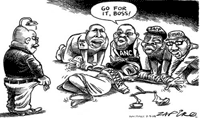South Africans protest on “Black Tuesday” for press
Media groups, watchdogs and opposition lawmakers in South Africa are today protesting against the Protection of State Information Bill passed by parliament, saying it could silence whistleblowing and investigative reporting.
The Bill, if passed, would make it illegal to hold or disclose sensitive information with jail terms of up to 25 years. Civil society groups fear the bill will be used to silence critical investigations into any form of journalism. The crucial part of the bill does not recognise “in the public interest” as a defence. Thus journalists would be forced to hand over sensitive information if the court deemed necessary. The legislation is intended to overhaul the outdated apartheid secrecy laws (which were extremely draconian and resulted in now famous contraventions of civil liberties.) Supporters of the bill claim it will address threats of espionage.
State Security Minister Siyabonga Cwele ruled out a public interest defence that would protect disclosure of classified information if a court deemed necessary. Cwele says the bill is constitutional and that it had undergone several important changes over the past year.
Press and media freedom is a hot topic in South Africa. Despite the country’s liberal constitution, there are still many frustrations around keeping civil servants to account, and monitoring the spending of government on large projects such as electricity and home-building. The whole notion of “public interest” is highly contested in a country where despite laudable achievements, they are still in the process of defining what free speech and the media as fourth estate actually means.
“The fact is that the secrecy Bill amounts to a full-scale legislative assault on the freedom of the press and other media in South Africa,” said MP David Maynier of the Democratic Alliance. However the Right2Know campaign, which opposes the Bill, said this week that “no public consultations have been conducted” and that promises by the ANC chief whip had been “utterly empty”.
The pressure group comments, “The Bill will threaten hard-won constitutional rights including access to information and freedom of expression. R2K believes a responsive and accountable democracy able to meet the basic needs of our people is built on transparency and the free flow of information.
The R2K campaign statement — “Let the truth be told. Stop the Secrecy Bill!” — demands that the Bill be drastically rewritten to bring it in line with constitutional values, or thrown out. “It is clear that parliamentarians are preparing to vote on the Bill without substantial changes,” they add.


